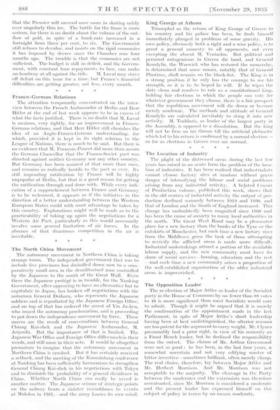The North China Movement The autonomy movement in Northern China
is taking strange turns. The independent government that was to include five provinces has dWindled down now to a com- paratively small area in the demilitarised zone controlled by the Japanese to the south of the Great Wall. Even there the Japanese protege is in trouble, for the Nanking Government, after appearing to have no alternative but to capitulate to Japan, has broken off negotiations with the notorious General Doihara, who represents the soldiers and is repudiated by the Japanese Foreign Office, and on top of that has ordered the arrest of Yin Ju-ken, who issued the autonomy proclamation, mid is, proceeding to put down the independence movement by force. These moves are the result of conversations. between General Chiang Kai-shek and the Japanese Ambassador, M. Ariyoshi. But the importance of that is limited. The Japanese War Office and Foreign Office differ much in their words, and still more in their acts. It would be altogether premature to imagine that the autonomy movement in Northern China is crushed. But it has certainly received a setback, and the meeting of the Kuomintang conference at Nanking has been sufficiently harmonious to strengthen General Chiang Kai-shek in his negotiations with Tokyo and to diminish the 'probability of a general dissidence in China: Whether North China can really be saved is another matter. The Japanese seizure of strategic points on the railway bears a Sinister resemblance to events at Miikden in 1931,–L•and the army knOWs its own mind.












































 Previous page
Previous page